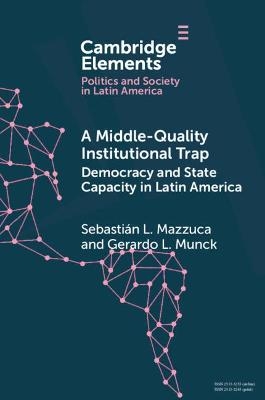
A Middle-Quality Institutional Trap: Democracy and State Capacity in Latin America
Seiten
2021
Cambridge University Press (Verlag)
978-1-108-81399-0 (ISBN)
Cambridge University Press (Verlag)
978-1-108-81399-0 (ISBN)
Latin America is caught in a middle-quality institutional trap, with flawed democracies and low-to-medium capacity States. Contrary to conventional wisdom, the development sequence - Latin America has democratized before building capable States - does not explain the region's quandary. States can make democracy, but so too can democracy make States.
Latin America is currently caught in a middle-quality institutional trap, combining flawed democracies and low-to-medium capacity States. Yet, contrary to conventional wisdom, the sequence of development - Latin America has democratized before building capable States - does not explain the region's quandary. States can make democracy, but so too can democracy make States. Thus, the starting point of political developments is less important than whether the State-democracy relationship is a virtuous cycle, triggering causal mechanisms that reinforce each other. However, the State-democracy interaction generates a virtuous cycle only under certain macroconditions. In Latin America, the State-democracy interaction has not generated a virtuous cycle: problems regarding the State prevent full democratization and problems of democracy prevent the development of state capacity. Moreover, multiple macroconditions provide a foundation for this distinctive pattern of State-democracy interaction. The suboptimal political equilibrium in contemporary Latin America is a robust one.
Latin America is currently caught in a middle-quality institutional trap, combining flawed democracies and low-to-medium capacity States. Yet, contrary to conventional wisdom, the sequence of development - Latin America has democratized before building capable States - does not explain the region's quandary. States can make democracy, but so too can democracy make States. Thus, the starting point of political developments is less important than whether the State-democracy relationship is a virtuous cycle, triggering causal mechanisms that reinforce each other. However, the State-democracy interaction generates a virtuous cycle only under certain macroconditions. In Latin America, the State-democracy interaction has not generated a virtuous cycle: problems regarding the State prevent full democratization and problems of democracy prevent the development of state capacity. Moreover, multiple macroconditions provide a foundation for this distinctive pattern of State-democracy interaction. The suboptimal political equilibrium in contemporary Latin America is a robust one.
1. A Research Agenda and Strategy; 2. The State-Democracy Interaction; 3 Paths and Outcomes; 4. Mechanisms and Outcomes; 5. Macroconditions of the State-Democracy Interaction; 6 Concluding Remarks.
| Erscheinungsdatum | 08.02.2021 |
|---|---|
| Reihe/Serie | Elements in Politics and Society in Latin America |
| Zusatzinfo | Worked examples or Exercises |
| Verlagsort | Cambridge |
| Sprache | englisch |
| Maße | 152 x 228 mm |
| Gewicht | 161 g |
| Themenwelt | Sozialwissenschaften ► Politik / Verwaltung ► Staat / Verwaltung |
| ISBN-10 | 1-108-81399-2 / 1108813992 |
| ISBN-13 | 978-1-108-81399-0 / 9781108813990 |
| Zustand | Neuware |
| Informationen gemäß Produktsicherheitsverordnung (GPSR) | |
| Haben Sie eine Frage zum Produkt? |
Mehr entdecken
aus dem Bereich
aus dem Bereich
Organisationen steuern, Strukturen schaffen, Prozesse gestalten
Buch | Softcover (2024)
Rehm Verlag
CHF 53,20


